Ready to rebound: four of the best engineering firms
British manufacturers have taken a battering – but the weakening pound is good news for these four sturdy survivors, says Alex Williams.
Get the latest financial news, insights and expert analysis from our award-winning MoneyWeek team, to help you understand what really matters when it comes to your finances.
You are now subscribed
Your newsletter sign-up was successful
Want to add more newsletters?

Twice daily
MoneyWeek
Get the latest financial news, insights and expert analysis from our award-winning MoneyWeek team, to help you understand what really matters when it comes to your finances.

Four times a week
Look After My Bills
Sign up to our free money-saving newsletter, filled with the latest news and expert advice to help you find the best tips and deals for managing your bills. Start saving today!
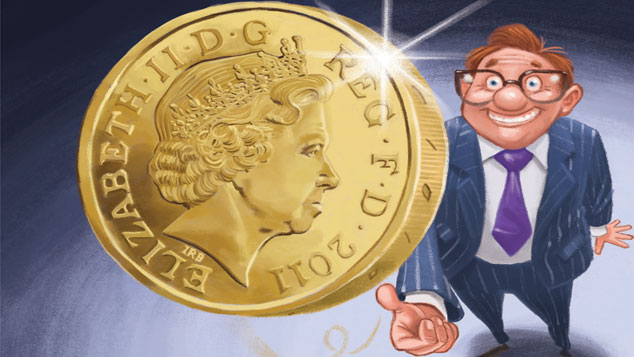
British engineering firmshave taken a battering but the weakening pound is good news for these four sturdy survivors, says Alex Williams.
The falling pound is grabbing headlines this week, with fund manager BlackRock warning of a "UK currency crisis", as MarketWatch.com puts it. But a drop in sterling is good news for one sector in the UK: British manufacturers. The recent sell-off in stockmarkets has hit volatile shares the hardest, leaving engineering groups looking cheap. And a falling currency will boost exporters and their order books. Here we profil four of the best engineering specialists in the UK: firms with high margins, high returns, strong balance sheets and long histories.
Rotork (LSE: ROR)
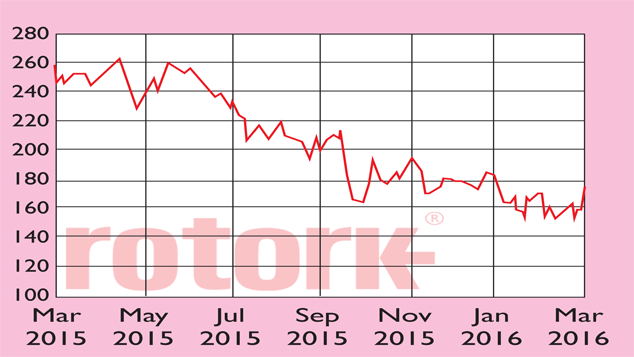
Rotork the company where inventor James Dyson began his career is based in Bath and makes valve actuators. These are the motors that open and close industrial valves, used in everything from water plants to pipelines and refineries.
MoneyWeek
Subscribe to MoneyWeek today and get your first six magazine issues absolutely FREE

Sign up to Money Morning
Don't miss the latest investment and personal finances news, market analysis, plus money-saving tips with our free twice-daily newsletter
Don't miss the latest investment and personal finances news, market analysis, plus money-saving tips with our free twice-daily newsletter
Rotork is the industry leader with a market share of around 15%-20%. Whenever you turn on a tap, fill up your car, or put on the kettle, there is a good chance that somewhere along the line, a Rotork actuator has sprung into life. "We are dedicated to this and nothing else," the company says.
What's so special?
Almost every valve (and every valve motor) has to deal with unique conditions: an actuator might be used once every few months in an oil pipeline in Libya, or several times a minute in an air-conditioning unit. The company's smallest actuators can fit in the palm of your hand, but the largest ever made was five metres wide.
It was designed for a subsea gas project off the coast of Egypt and cost more than £1m. Every actuator therefore has to be designed and custom-built. Rotork has a core range in five different sizes, which it then customises in line with their specific use, down to the colour and fireproof coating. Finance director Jonathan Davis calls it a "batch of one" mentality.
At least 300 parts go into the average actuator and Rotork outsources the manufacture, before assembling and testing them in-house. By focusing on pure assembly work, the company remains nimble (in 2010, it delivered a batch of actuators to a refinery owned by Shell in less than a week) and asset-light (Rotork does not need to invest in metal or plastics plants). One of its biggest costs is its sales force: tendering to supply a new BP refinery, for example, might mean tendering to BP, its valve-maker and two or more different contractors.
Safety is paramount: unlike a Rolls-Royce engine, which undergoes constant stress and is continually stripped down and rebuilt, actuators are expected to work uninterrupted as a reliable, invisible component for 20 to 30 years. In several situations, such as use in nuclear power stations, they have to be fail-safe and explosion-proof. In financial terms this means that actuators are a critical component for buyers, and the cost of buying the best available is always negligible, versus the total cost of a refinery, power plant or water treatment station.
Why have the shares fallen?
Roughly half of Rotork's sales come from the oil and gas industry, so its order book has tumbled with the oil price. The reliability of Rotork's products also works against the company: again, unlike Rolls-Royce, which has built a significant services division to maintain its fleet of engines, the fact that Rotork actuators are expected to work faultlessly with almost zero maintenance leaves the company with little recurring revenue. New business depends on big-ticket spending by oil and infrastructure groups, so sales can be choppy and are prone to fluctuate sharply with changes in global GDP.
What's the longer-term view?
Rotork's order book has taken a short-term hit, but the company has been making valve motors for BP since the 1940s and for the French atomic agency since the 1960s. It has grown its dividend every year for nearly two decades and has had virtually zero debt since at least the 1990s.
Oil is a large part of its business, but Rotorksupplies several other industries, including water, nuclear and renewables. Sales are evenly spread between Europe, the Americas and the rest of the world. As a result, the current downturn is an opportunity, rather than a crisis. Rotork's shares have historically been expensive, hitting 28 times earnings in 2013, reflecting the quality of its business. But the shares are now yielding 3% (before special dividends) and, at 14 times trailing earnings, are now almost as cheap as they've ever been.
Victrex (LSE: VCT)
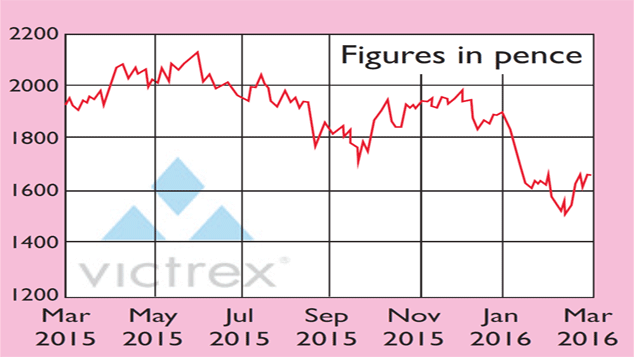
Victrex, which was originally part of chemical giant ICI, makes high-performance plastics. Its core product is called PEEK. This is a super-light, durable, high-strength polymer, used in everything from aeroplanes to dentistry.
What's so special?
Victrex's PEEK polymer can replace metal in almost any industrial application. It is more expensive than steel alloys, but it is also lighter, harder-wearing and more temperature-resistant. As a result, it is being used to replace metal in many critical, high-wear components. Coating car brakes and gearboxes with the plastic, for example, reduces noise and increases durability. But most importantly it saves on weight, which increases fuel efficiency and cuts costs in the long run.
This makes PEEK particularly appealing to the aerospace industry. Airplanes are increasingly using PEEK in their pipework and pipe brackets, which means lighter planes and therefore lower fuel costs. Many of the world's largest aerospace manufacturers specify Victrex materials in their designs, meaning the company gets plenty of repeat business. PEEK is also making its way into medical parts, dentistry and smartphones. It is used in tiny quantities the company only has the capacity to produce around 7,000 tonnes per annum, generating over £250m in sales each year but Victrex's plastics are already used in more than 200 million brakes worldwide and more than 15,000 aeroplanes.
Why have the shares fallen?
Victrex is headquartered in Lancashire, but 97% of its sales come from exporting PEEK to more than 40 different countries. Earnings are therefore sensitive to strength in the pound, and the shares have sold off as sterling has strengthened in the last year against the euro, which accounts for just over half of its sales. Victrex has also fallen with smartphone sales in recent months. PEEK is an expensive, high-end material, so the company inevitably suffers during a global spending downturn.
What's the longer-term view?
Victrex suffered last quarter from weak trading in electronics, but its medical unit did well, demonstrating the main strength of the business. PEEK has so many different end-uses that Victrex has exposure to a diverse range of industries and customers, from health care to carmakers. Its export model has hurt the shares in the short term, but with the pound now falling against the euro, that has gone into reverse. The company has £54m in cash, no debt and massive profit margins.
By working with customers to test new applications for its plastic, Victrex keeps finding new uses and new markets for PEEK sales have grown nearly every year for two decades. At 16 times earnings, the shares are as cheap as they've been for five years. The dividend yield of 3% is an added bonus, paying investors to buy and hold a high-quality company.
Rolls-Royce (LSE: RR)
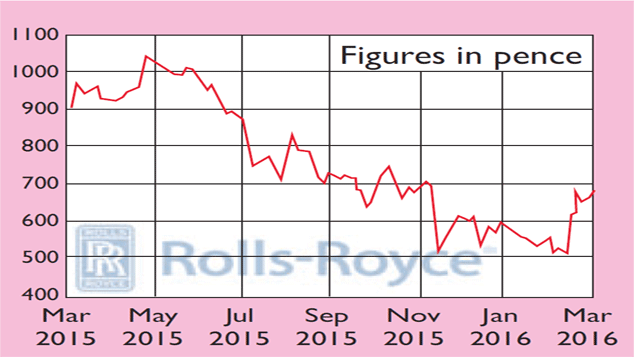
Rolls-Royce was founded in 1884. It makes engines. Just over half its sales come from supplying civilian aircraft. It also makes engines and propulsion systems for boats, helicopters, jets and military aircraft.
What's so special?
Rolls-Royce is the world's second-largest manufacturer of aerospace engines and the world leader in jet engines for long-haul flights. It has invested heavily in recent years in semi-automated factories. Its new blade-manufacturing facility in Rotherham, for example, is due to produce 100,000 jet engine blades a year, manned by just 150 people. Rolls-Royce has also revolutionised the jet-engine business through its intensive services business.
From an operations centre in Derby, the company uses satellites to monitor the performance of its engines in mid-flight in real-time, mobilising technicians on the ground 24 hours a day. The majority (70%) of the engines it sells are sold with aftercare contracts, locking in revenue for decades to come. Its order book is booming: the company is due to produce 4,000 of its Trent series jet engines in the next ten years, more than double the previous decade.
Why have the shares fallen?
Jet engines have traditionally been highly profitable, but Rolls-Royce has pioneered a new sales structure, whereby new engines are sold at a loss, with the money recouped over the life of a long-term servicing contract. That should mean steadier business, as each new sale becomes a revenue stream. But in the short term, profits are down and the shares have collapsed. The company has issued five consecutive profit warnings, pre-tax profits are expected to halve this year and the dividend was cut last month for the first time in 24 years.
The record order book has also forced Rolls-Royce to build new factories, meaning it is running old and new sites at once, adding around £100m each year to costs until around 2020. Margins are therefore lower than those of its largest US rivals in America. San Francisco-based activist investor, ValueAct, has bought 10% of the shares and has called for a break-up, winning a seat on the board.
What's the longer-term view?
Sales dipped by 1% last year to £13.7bn, hardly a travesty. Rolls-Royce also has a $77bn backlog of orders from Boeing and Airbus that will take ten years to work through, more than enough time for a pick up in demand. Meanwhile, all those profit warnings have flattened the City's expectations, giving chief executive Warren East the freedom to be ruthless in overhauling the business.
He has simplified its structure by merging two mega-divisions into one group, removing a top layer of management, and taking £150m-£200m out of senior management costs each year. And 3,600 jobs have been cut from the 55,000 strong workforce.
Rolls-Royce is going through a transition, which caught the City by surprise. But its services model will ultimately mean ultra-predictable revenue. Shares are down by more than 40% from their peak, giving investors an opportunity to buy into a long-term story, and earnings and dividends should bounce back as East enforces his changes.
Spirax Sarco (LSE: SPX)
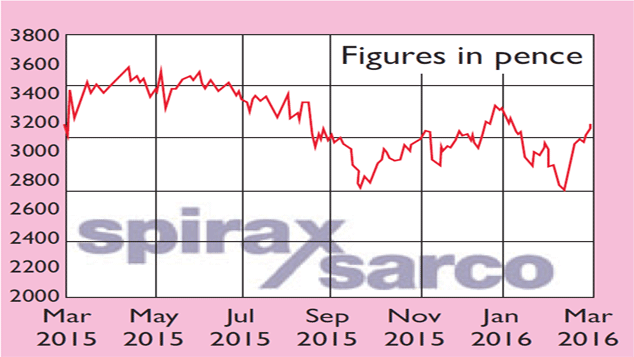
Spirax Sarco specialises in steam engineering. It has factories in the UK and across northern Europe, producing pumps, valves and tubes for dairies, paper mills, brewers, hospitals and food plants.
What's so special?
Steam power sounds outdated, yet it is used in almost every industrial process. High-spec steam-powered pumps are also energy efficient and non-polluting and Spirax Sarco is the world leader, with 18% market share. Nearly half of its business comes from servicing and replacement parts, giving the company stable earnings, compared to its rivals.
Why have the shares fallen?
Emerging markets account for 35% of sales, so the strength of the pound has weighed on trading, with revenue and pre-tax profits both dipping last year. The company has also carried the cost of opening a new business in India. High energy prices typically encourage customers to switch to steam, but energy prices are falling, and supplying spare parts means the company has a short order book, giving it little visibility into the future.
What's the longer-term view?
Spirax Sarco has built a strong position in an overlooked niche. Sales have more than doubled in the last ten years and its return on capital is consistently higher than 20%, leaving it with a strong balance sheet and £52m in net cash. It supplies a wide range of industries, giving it stable earnings. Selling spare parts to the food industry, its largest single buyer, could hardly be a steadier business. But the firm's reputation for reliability means its shares have not fallen nearly as far as peers. At 25 times earnings, Spirax Sarco's shares are not cheap, but a weakening pound will be an important tailwind.
Get the latest financial news, insights and expert analysis from our award-winning MoneyWeek team, to help you understand what really matters when it comes to your finances.
-
 New PM Sanae Takaichi has a mandate and a plan to boost Japan's economy
New PM Sanae Takaichi has a mandate and a plan to boost Japan's economyOpinion Markets applauded new prime minister Sanae Takaichi’s victory – and Japan's economy and stockmarket have further to climb, says Merryn Somerset Webb
-
 Plan 2 student loans: a tax on aspiration?
Plan 2 student loans: a tax on aspiration?The Plan 2 student loan system is not only unfair, but introduces perverse incentives that act as a brake on growth and productivity. Change is overdue, says Simon Wilson
-
 Invest in space: the final frontier for investors
Invest in space: the final frontier for investorsCover Story Matthew Partridge takes a look at how to invest in space, and explores the top stocks to buy to build exposure to this rapidly expanding sector.
-
 Invest in Brazil as the country gets set for growth
Invest in Brazil as the country gets set for growthCover Story It’s time to invest in Brazil as the economic powerhouse looks set to profit from the two key trends of the next 20 years: the global energy transition and population growth, says James McKeigue.
-
 5 of the world’s best stocks
5 of the world’s best stocksCover Story Here are five of the world’s best stocks according to Rupert Hargreaves. He believes all of these businesses have unique advantages that will help them grow.
-
 The best British tech stocks from a thriving sector
The best British tech stocks from a thriving sectorCover Story Move over, Silicon Valley. Over the past two decades the UK has become one of the main global hubs for tech start-ups. Matthew Partridge explains why, and highlights the most promising investments.
-
 Could gold be the basis for a new global currency?
Could gold be the basis for a new global currency?Cover Story Gold has always been the most reliable form of money. Now collaboration between China and Russia could lead to a new gold-backed means of exchange – giving prices a big boost, says Dominic Frisby
-
 How to invest in videogames – a Great British success story
How to invest in videogames – a Great British success storyCover Story The pandemic gave the videogame sector a big boost, and that strong growth will endure. Bruce Packard provides an overview of the global outlook and assesses the four key UK-listed gaming firms.
-
 How to invest in smart factories as the “fourth industrial revolution” arrives
How to invest in smart factories as the “fourth industrial revolution” arrivesCover Story Exciting new technologies and trends are coming together to change the face of manufacturing. Matthew Partridge looks at the companies that will drive the fourth industrial revolution.
-
 Why now is a good time to buy diamond miners
Why now is a good time to buy diamond minersCover Story Demand for the gems is set to outstrip supply, making it a good time to buy miners, says David J. Stevenson.